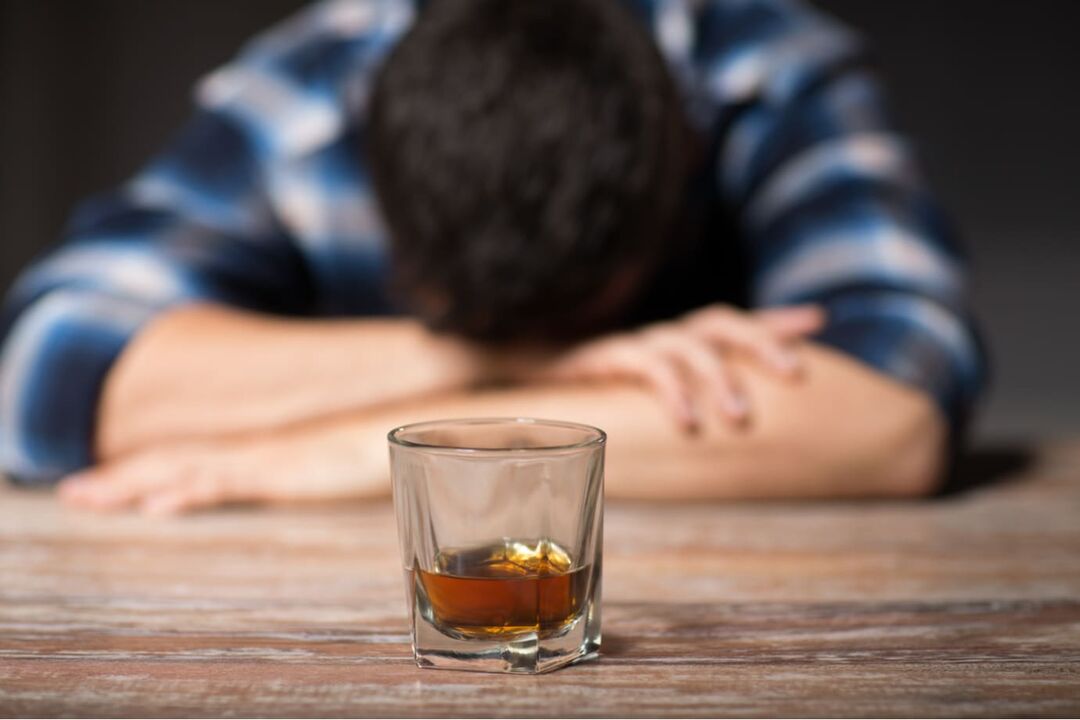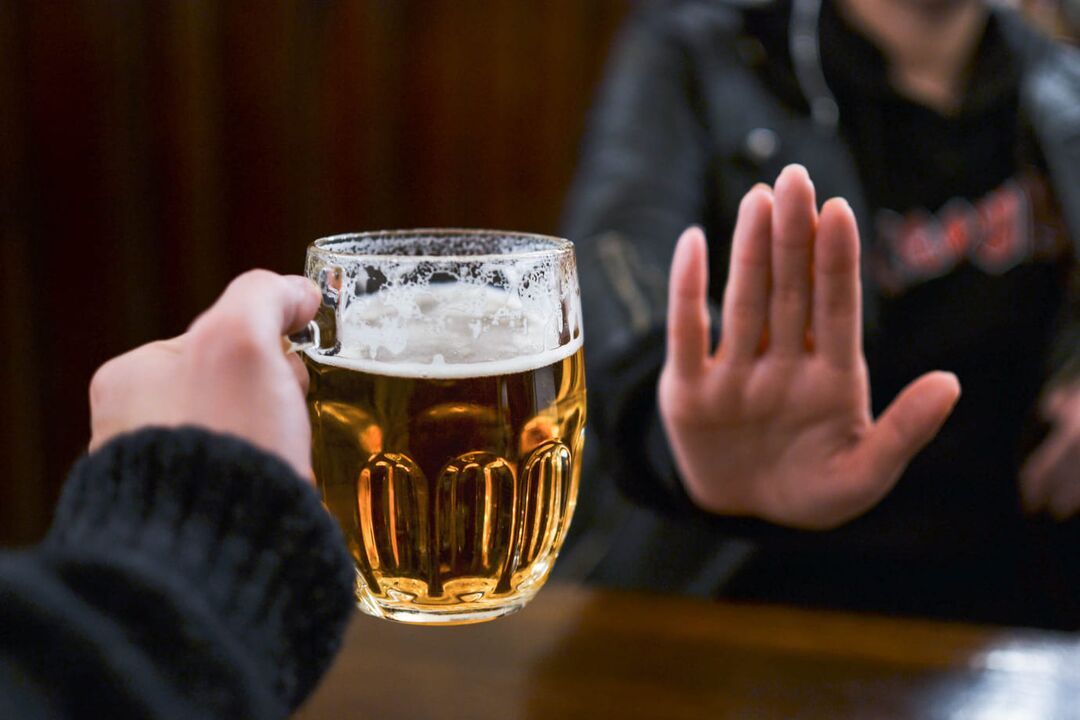Is it possible to abruptly give up drinking - for sure, especially with a firm decision to give up daily alcohol intake. Yes, it won't be easy, but the "pros" of a healthy lifestyle will be assessed much faster. Narcologists compare the gradual reduction in the amount of alcoholic beverages to cutting off the tail in parts. In order not to start all over again, it is advisable to endure a temporary deterioration in well-being.
Sudden abstinence from alcohol - interesting reactions of the body
Alcoholism is both a physical and a psychological dependence on ethyl alcohol. Therefore, when it suddenly stops entering the body, an immediate reaction follows from almost all vital systems. Not surprisingly, they now have to work in a modified mode. But do not pay attention to the temporary deterioration of health, because the "friendship" with ethanol is expensive for the body. Here are the expected consequences of giving up alcohol in the first few days:
- weight loss due to appetite suppression;
- insomnia followed by drowsiness;
- dull migraine-type headaches;
- psycho-emotional instability - irritability, unexplained anxiety, apathy;
- mild migrating joint pain, tremor of the fingers.
It sounds scary, but these withdrawal symptoms are more common in older alcoholics. If a person uses a little, but every day, then the physical condition practically does not worsen. There is only psychological discomfort without the usual bottle of beer, a glass of wine or 50-100 grams of vodka.
What are the reasons for such a violent reaction of the body to an acute refusal to drink? The fact is that ethanol is involved in biochemical reactions, becoming their equal participant. When you try to remove it from there, there is a temporary failure in the body. Now he will have to establish nervous regulation, cope with the production of the optimal amount of digestive enzymes and repair the damaged liver and urinary organs. He copes with these tasks for about 1-1, 5 months.

Typical signs of alcohol withdrawal
How to give up alcohol forever - full mobilization of the will is required only with systematic domestic drunkenness. In such cases, a person drinks a lot, often, constantly experiencing all the "pleasures" of a hangover. After the next overeating he has problems with the psyche, heart and liver, he is determined to "leave". What's next for the alcoholic:
- One day. Withdrawal symptoms are immediately manifested by nausea and vomiting, headache, severe tremors and, of course, an unbearable desire to hang over. In fact, the first day of sobriety turns into an alcohol strength test. If he can endure it without alcohol, then his chances of overcoming addiction rise sharply;
- 2-7 days. During this period, the alcoholic feels unwell - the body needs the usual amount of alcohol, punishing the "owner" with headaches, visual and auditory hallucinations, trembling hands and feet. Digestion and peristalsis are disturbed and the prospects for a healthy lifestyle seem lessbright for the alcoholic. Don't give up at this stage, medication and sleep will help you get to the end;
- Day 8. To make it a little easier, the improvements are noticeable to the naked eye. The severity of the withdrawal syndrome decreases, the body adapts well to the changed conditions of existence. He is now busy repairing organs and tissues, learning to work fully without ethanol. Headache, nausea and irritability subside as ethyl alcohol and its toxic metabolites no longer circulate in the blood;
- 30-40 days. That's all - now one can give advice on how to give up alcohol. Lightness appears in the body, physical and mental performance improves, seemingly lost professional skills return. All vital systems function perfectly, the body works like a clock. But you should not relax - even a sip of beer during this period can cause damage.
And now a little fly in the ointment. If a person drank a lot and often, then his internal organs were constantly exposed to ethanol. In a state of intoxication, the cells were destroyed without subsequent recovery. Chronic diseases developed that the alcoholic did not even suspect. Eventually, he suppressed all anxious symptoms with another serving of alcohol. But outside of the state of euphoria, it will not be possible not to notice them. It's time for a full medical examination. After the diagnosis, the doctor will prepare a competent therapeutic regimen and prescribe medication.
The sad consequences of a long alcoholic experience are fatty degeneration of the liver, hepatitis, nephrosis, atrophic gastritis or high acidity. All pathologies are severe but completely treatable, so the prognosis is favorable. So acute abstinence from alcohol sometimes avoids disability and even death. After all, as the alcoholic tries to "quit" by reducing the dose, dangerous diseases develop, progress, and recur in his body.

We will help you in any way - advice for those who decide to quickly "tie"
The decision to stop drinking is often made spontaneously when a person suddenly realizes that a stroke, heart attack or cirrhosis are just around the corner. Therefore, he does not have time to prepare for the upcoming withdrawal of alcohol after overeating. Unlike relatives, family members who can quickly find all the information they need. It is necessary to help a person to give up drinking, to support, to replace the shoulder in a difficult period of life.
The injury is more than real in the first two weeks, so it makes sense to seek professional medical help. The transition to a sober lifestyle will be easier with pharmacological support. Will help parenteral administration of saline, B vitamins, sedatives and anticonvulsants, respiratory analeptics, antiarrhythmic drugs, nootropics. The results of the medical intervention are obvious:
- heart rate and respiration return to normal;
- sleep and appetite will be restored;
- nausea and vomiting will stop after the next meal.
How to stop heavy drinking - only by combining the will, the use of drugs and psychological support. The latter is very important because the state of the central nervous system changes dramatically. While she is adapting to work without ethanol, the addicted person suffers from hallucinations. He discusses with imaginary interlocutors, withdraws into himself for a few hours and even sings. It is not worth focusing on this - the psyche will recover after the evacuation of harmful substances from the body.
Proper rehabilitation - learning a new life
How to give up alcohol completely is a hot question. Narcologists note that the likelihood of long-term remission increases significantly with a person's active desire to refuse alcohol. Therefore, when making an important decision to give up drinking, the alcoholic must understand that now everything that contains ethanol is strictly forbidden.
It is difficult to part forever with alcohol without preparation. Once you have overcome the most difficult early days of withdrawal symptoms, you should look for additional resources to alleviate your physical and psychological condition:
- Exclude from the usual diet fatty and fried foods, foods saturated with salt and spices.
- Walk in the fresh air for 1-2 hours at least once a day.
- They will return to their old hobbies, to what has aroused interest in immersion in unbridled drunkenness.
The transition to a sober lifestyle is happening gradually. One often falls into despondency, seeing the future only in black. And then he gathers, persuades not to give up, again participates in solving family problems. Narcologists advise to speed up recovery through physical activity. You don't have to go straight to the gym or run long distances. Gentle physical therapy is a great way to recover quickly.































